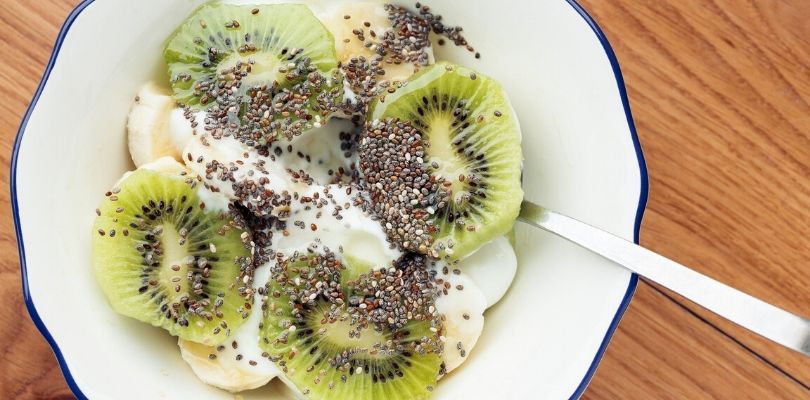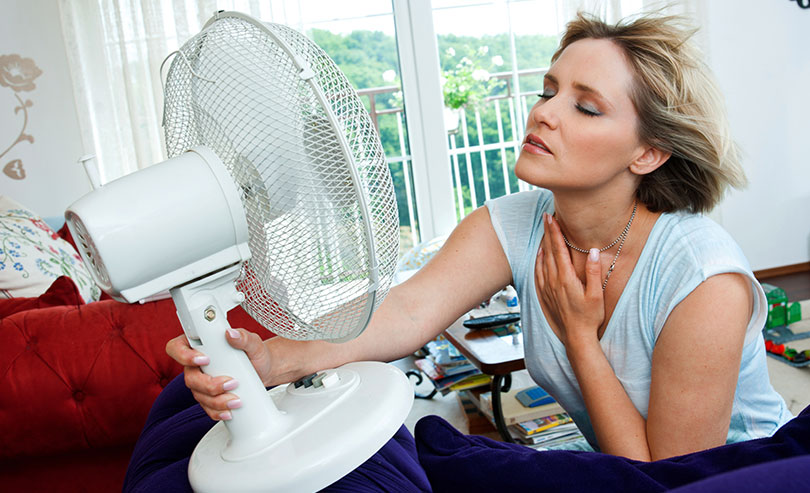Menopause Diet: What to Eat During Menopause
Menopause is the permanent cessation of a women’s menstrual cycle, resulting from the loss of ovarian follicular activity. Menopause is diagnosed when a woman goes 12 months without a menstrual period. The symptoms of menopause including hot flashes, and mood swings, among others, can be quite disruptive to a woman’s life. The good news is that consuming a healthy and balanced menopause diet can help to manage some of the uncomfortable symptoms of menopause, helping to make this transitional period easier.
What Causes Menopause?
Natural menopause occurs when the ovaries decrease their production of sex hormones, including estrogen and progesterone, as well as a rise in follicle-stimulating hormone (FSH) and luteinizing hormone (LH) levels. Natural menopause typically occurs between the ages of 40 and 60, with the average age of menopause being 51 years.
Other causes of induced menopause include:
- Hysterectomy with bilateral oophorectomy (the removal of the uterus and both ovaries)
- Chemotherapy or radiotherapy
- Primary ovarian deficiency (rare cases of early menopause caused by genetics or an autoimmune disease)
Signs and Symptoms of Menopause
There are a wide range of signs and symptoms of menopause, including:
- Irregular periods
- Bleeding between periods
- Vaginal dryness
- Chills
- Hot flashes
- Night sweats
- Sleep difficulties
- Weight gain
- Slowed metabolism
- Thinning hair
- Dry skin
- Decreased breast fullness
- Decreased bone density, which leads to an increased fracture risk
- Urinary incontinence
- Decreased sex drive
- Mood swings
- Anxiety or depression
- Decreased concentration
- Forgetfulness
- Nervousness
- Vertigo
- Weakness
- Muscle and joint pain
- Headaches
It’s important to keep in mind that signs and symptoms of menopause affect every woman differently. However, most women experience some irregularity in their menstrual cycle before they stop completely. For example, skipping periods during perimenopause is quite common and menstrual periods will often skip a month and come back, or skip several months before returning to monthly cycles for a few months. Additionally, many women experience shorter menstrual cycles so they are closer together.
A Dietary Guideline for Menopause
To combat the broad range of symptoms associated with menopause, consuming a healthy and balanced diet is essential. While some foods help to manage menopause symptoms and reduce the risk of complications, some foods do the exact opposite, increasing menopause symptoms and boosting the risk of complications. As your body goes through this new phase, its nutrient requirements also change and become more specific. Consuming the right type of food in your diet is crucial to make this transitional period in your life as comfortable as possible.
The symptoms experienced by women during menopause differ due to genetics, medical history, environment and lifestyle. With this in mind, it would be wrong to declare a “one size fits all” diet or list of foods to add to your diet. A basic understanding of the different nutrients each class of food provides and knowing the symptoms that they combat, as well as the complications they help prevent, can help you have a better understanding of what constitutes a healthy menopause diet.
What Does a Good Menopause Diet Look Like?
From dairy products, to meats and carbohydrates, here are some great foods to help menopause symptoms.
Dairy Products
Dairy products, including fortified milk, yogurt and cheese, are an important addition to your diet. Due to a decrease in estrogen levels during menopause, there is a loss of bone density, which increases your fracture risk. Dairy products are rich in calcium, phosphorus, potassium, magnesium, and vitamins D and K, all of which contribute greatly to bone health and density. There is also some evidence that suggests that consuming dairy products may help to improve sleep.
Yoga can be both calming and challenging. Practicing yoga for menopause should focus on restoring balance by calming your nerves and cooling your body.
Whole Grains
Whole grains such as brown rice, wheat, barley, quinoa and rye are essential components of a healthy menopause diet. With nutrients such as fiber and a broad pallet of B vitamins (thiamine, niacin, riboflavin and pantothenic acid), it is a useful addition to any woman’s diet, especially during menopause. Whole grains have been known to reduce the risk of cancer and heart disease, which are common complications among women during menopause, especially during the post-menopausal phase. They also decrease the risk of premature death.
Fruits and Vegetables
Fruits and vegetables are the cornerstone of any healthy diet plan and they play a major role in the body during menopause. Fruits and veggies contain vitamins, minerals, antioxidants and fiber, so you can choose fruits and veggies that please your taste buds.
Studies have found that consuming fruits and veggies can help to control symptoms such as hot flashes, sleep difficulties and depression. In particular, consuming cruciferous veggies, such as broccoli, has been found to protect against breast cancer. Dark berries have shown the ability to lower blood pressure.
Healthy Protein
Foods including eggs, meat, chicken, fish, legumes and dairy products are high in protein. Protein is usually deficient in menopausal women due to the decline in estrogen. A high intake of protein helps to combat muscle loss, low bone density and other associated symptoms. Current guidelines recommend that women over the age of 50 consume 0.45 grams to 0.55 grams of protein per pound of body weight each day, which equates to about 20 grams to 25 grams of good quality protein per meal.
Healthy Fats
Healthy fats, including omega 3 fatty acids, may help to combat some symptoms of menopause including hot flashes and night sweats. Foods that are high in omega 3 fatty acids include fatty fish (salmon, anchovies, mackerel), as well as seeds (chia seeds, flax seeds, hemp seeds).
Water
You need to stay hydrated at all times. Drinking water regularly has been known to combat symptoms such as dry skin, dry hair, vaginal dryness and headaches.
Phytoestrogen Foods
Phytoestrogens can be found in soybeans, peanuts, chickpeas, flax seeds, grapes, barley, berries, plums, and green and black tea. They act as weak estrogens in the body. While research has been conflicting about the addition of phytoestrogen containing foods in the diet, recent research suggests that they may have health benefits, particularly for menopausal women. Research has also shown that they may help to increase estrogen levels and decrease hot flashes.
Foods to Avoid During Menopause
While there are foods that can help with symptoms, there are also foods that can trigger symptoms. Here are some foods to be aware of.
High-fat Foods
As opposed to healthy fats, such as omega 3 fatty acids found in fatty fish, high-fat foods raise the body’s cholesterol level and increase the chance of heart disease. High-fat food should equate to 25% or less of your daily calorie consumption; anything more than 35% can be hazardous.
Salt and Sugar
Total abstinence from salt and sugar is not necessary, but a reduction of intake is beneficial. Salt and sugar have high levels of sodium and excessive sodium intake has been linked to high blood pressure; when coupled with menopause, the risk is doubled during this stage of your life.
Alcohol and Caffeine
Alcohol and caffeine are known to disrupt the body's general metabolism and sleep patterns. One major symptom of menopause is disturbed sleep, therefore a high consumption of caffeine and alcohol can escalate disruptions in your sleeping patterns. Alcohol has also been known to trigger hot flashes in women during menopause.
In Conclusion
Menopause affects women in different ways, resulting in differing signs and symptoms. Consume a healthy and balanced diet that includes dairy products, whole grains, fruits and veggies, healthy proteins and fats, as well as adequate water and avoid foods that are high in fat, salt and sugar. Make sure to also minimize your alcohol and caffeine consumption, as this can go a long way to managing your menopause symptoms and minimizing your risk of complications, making this transitional period in your life as comfortable as possible.







